Publications
-
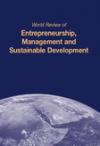 Laszlo Zsolnai edited the "Spirituality and Sustainability Management" Special Issue of World Review of Entrepreneurship, Management and Sustainable Development 2014 Vol 10. No.1. This special issue is a product of the Spirituality and Sustainability: A New Path for Entrepreneurship Conference held on 21–23 September 2012 in Visegrad, Hungary.
Laszlo Zsolnai edited the "Spirituality and Sustainability Management" Special Issue of World Review of Entrepreneurship, Management and Sustainable Development 2014 Vol 10. No.1. This special issue is a product of the Spirituality and Sustainability: A New Path for Entrepreneurship Conference held on 21–23 September 2012 in Visegrad, Hungary. -
The centenary of E.F. Schumacher’s birth (1911-1977) offered an urgent opportunity to revisit his work and life. Against the background of the crisis at the beginning of this century, reconsidering Schumacher’s Small is Beautiful or frugality paradigm makes clear that advances in responsible economics continue to be a priority. This book contains the proceedings of the 2011 Annual Conference of the European SPES Forum on ‘Responsibility in Economics and Business: The Legacy of E.F. Schumacher’, which was organised in September 2011 by the Centre for Ethics of the University of Antwerp in collaboration with the Business Ethics Center of Budapest.
-
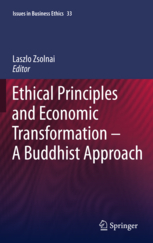 The book "Ethical Principles and Economic Transformation" presents new contributions of Buddhist economics to pressing socio-economic problems. Buddhism points out that emphasizing individuality and promoting the greatest fulfillment of the desires of the individual conjointly lead to destruction. The book promotes the basic value-choices of Buddhism, namely happiness, peace and permanence.
The book "Ethical Principles and Economic Transformation" presents new contributions of Buddhist economics to pressing socio-economic problems. Buddhism points out that emphasizing individuality and promoting the greatest fulfillment of the desires of the individual conjointly lead to destruction. The book promotes the basic value-choices of Buddhism, namely happiness, peace and permanence. -
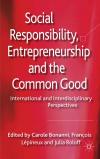 The authors of this book feel that the time for reinventing business has come; and this implies thinking differently, jumping across the comfortable barriers of management sub-disciplines, seeking the intersections between areas that usually do not communicate. The ongoing evolution of international events seems to confirm this feeling.
The authors of this book feel that the time for reinventing business has come; and this implies thinking differently, jumping across the comfortable barriers of management sub-disciplines, seeking the intersections between areas that usually do not communicate. The ongoing evolution of international events seems to confirm this feeling. -
 The Palgrave Handbook of Spirituality and Business summarizes the most important issues, approaches and models in the field of spirituality in business, economics and society. It presents a comprehensive pluralistic view covering all the major religious and spiritual traditions. It is a response to three developments that challenge the business-as-usual mindset. Firstly, in response to a growing interest in spirituality applied to models of transformational leadership, in theories of social capital and in practices of values-driven management, it explores the emerging field of business spirituality—its main concepts, models and practices.
The Palgrave Handbook of Spirituality and Business summarizes the most important issues, approaches and models in the field of spirituality in business, economics and society. It presents a comprehensive pluralistic view covering all the major religious and spiritual traditions. It is a response to three developments that challenge the business-as-usual mindset. Firstly, in response to a growing interest in spirituality applied to models of transformational leadership, in theories of social capital and in practices of values-driven management, it explores the emerging field of business spirituality—its main concepts, models and practices. -
The book "Spirituality and Ethics in Management" is a collection of scholarly papers focusing on the role of spirituality and ethics in renewing the contemporary management praxis. The basic argument is that a more inclusive, holistic and peaceful approach to management is needed if business and political leaders are to uplift the environmentally degrading and socially disintegrating world of our age. The book uses diverse value-perspectives (Hindu, Catholic, Buddhist, and Humanist) and a variety of disciplines.
-
 The book contains essays in honor of the 70th anniversary of K.U.Leuven professor Luk Bouckaert, co-founder of the European SPES forum, which aims to make spirituality accessible as a public good to as many people as possible. In the spirit of the European SPES forum, this volume covers issues of contemporary economics using a humanist perspective and discusses interrelated problems of business, ethics and society from spiritually based viewpoints. The authors argue for practicing economic wisdom in economic and social life.
The book contains essays in honor of the 70th anniversary of K.U.Leuven professor Luk Bouckaert, co-founder of the European SPES forum, which aims to make spirituality accessible as a public good to as many people as possible. In the spirit of the European SPES forum, this volume covers issues of contemporary economics using a humanist perspective and discusses interrelated problems of business, ethics and society from spiritually based viewpoints. The authors argue for practicing economic wisdom in economic and social life. -
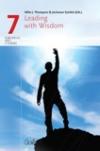 The European SPES Forum continues its mission to bring informed debate on issues related to spirituality and society in this seventh cahier with a focus on the nature of wisdom and its practice by leaders. Eight authors bring a breadth of style and thinking to the way in which leaders lead and how wisdom (connected to spirituality) can result in a more integrated and peaceful practice of leadership. We are treated to both narrative, reflective and academic perspectives on Leading with Wisdom and the authors find wisdom to be closely connected to virtue, character, integrity, morality, spirituality, meaning and the knowledge of how to live well.
The European SPES Forum continues its mission to bring informed debate on issues related to spirituality and society in this seventh cahier with a focus on the nature of wisdom and its practice by leaders. Eight authors bring a breadth of style and thinking to the way in which leaders lead and how wisdom (connected to spirituality) can result in a more integrated and peaceful practice of leadership. We are treated to both narrative, reflective and academic perspectives on Leading with Wisdom and the authors find wisdom to be closely connected to virtue, character, integrity, morality, spirituality, meaning and the knowledge of how to live well. -
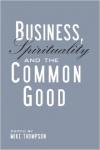 Business, Spirituality and the Common Good provides a robust and thorough look at the nature of business and spirituality and how they can reinforce each other for human flourishing and the common good of all. the book does not offer a one size fits all answer to complex questions, rather it provokes the reader to think deeply on these important issues. Contributors include Luk Bouckaert, Helen Alford, Mike J. Thompson, Sanjoy Mukharjee, Francois Lépineux, and Judy Neal.
Business, Spirituality and the Common Good provides a robust and thorough look at the nature of business and spirituality and how they can reinforce each other for human flourishing and the common good of all. the book does not offer a one size fits all answer to complex questions, rather it provokes the reader to think deeply on these important issues. Contributors include Luk Bouckaert, Helen Alford, Mike J. Thompson, Sanjoy Mukharjee, Francois Lépineux, and Judy Neal. -
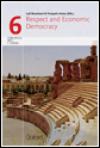 Respect and Economic Democracy is based on the hypothesis that democracy will become a growing ingredient of good business and leadership. Many contributions of this sixth European SPES Cahier disclosing new practices of democratic entrepreneurship confirm this hypothesis. The authors assume that economic democracy implies a commitment rooted in respect.
Respect and Economic Democracy is based on the hypothesis that democracy will become a growing ingredient of good business and leadership. Many contributions of this sixth European SPES Cahier disclosing new practices of democratic entrepreneurship confirm this hypothesis. The authors assume that economic democracy implies a commitment rooted in respect. -
 The authors share the idea that narratives offer their readers an alternative fictional world. In doing this they hold up a mirror that confronts the reader with otherness that questions his self-evident norms and values but also his daily practices. Both heroes and antiheroes contribute to this process of reflection. The confrontation with literary texts stimulates the intellectual, the emotional and the social consciousness. The firm belief that divergent (cultural) systems i.e. business ethics and literature can enrich each other is at the core of this project.
The authors share the idea that narratives offer their readers an alternative fictional world. In doing this they hold up a mirror that confronts the reader with otherness that questions his self-evident norms and values but also his daily practices. Both heroes and antiheroes contribute to this process of reflection. The confrontation with literary texts stimulates the intellectual, the emotional and the social consciousness. The firm belief that divergent (cultural) systems i.e. business ethics and literature can enrich each other is at the core of this project. -
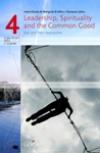 The authors of the book believe that the European and Asian traditions of spirituality provide rich resources for world seeking to rediscover the Common Good. The particular focus of this Cahier is on the need for responsible leaders who understand and accept their responsibility to steward the resources in their care for the good of their organisation and for the Common Good. Such leaders will have developed the capacity to integrate the economic, the social and the environmental realms and inspire trust in their organisational communities through the quality of their character and spirit.
The authors of the book believe that the European and Asian traditions of spirituality provide rich resources for world seeking to rediscover the Common Good. The particular focus of this Cahier is on the need for responsible leaders who understand and accept their responsibility to steward the resources in their care for the good of their organisation and for the Common Good. Such leaders will have developed the capacity to integrate the economic, the social and the environmental realms and inspire trust in their organisational communities through the quality of their character and spirit. -
 Authors of the book share the idea of Europe as a space of unity-in-diversity based on relations of reciprocity and fraternity. They see it as Europe’s mission to enlarge its post-war idea of peace and integration into a global action. Even though the European Union started in the sphere of economics, it was from the beginning more than economics. Therefore this cahier calls for a stronger sense of spiritual commitment and moral imagination in Europe.
Authors of the book share the idea of Europe as a space of unity-in-diversity based on relations of reciprocity and fraternity. They see it as Europe’s mission to enlarge its post-war idea of peace and integration into a global action. Even though the European Union started in the sphere of economics, it was from the beginning more than economics. Therefore this cahier calls for a stronger sense of spiritual commitment and moral imagination in Europe. -
The book "Business, Globalization and the Common Good" brings together contributions from various disciplines, written by scholars who are at the forefront of this debate. It provides multiple insights into a tripartite relationship: business, globalization and the common good. It helps explain why the business sphere will probably not be in a position to ignore the common good much longer, and why this latter concept, widely ignored in today's management realm, is likely to become part of tomorrow's corporate policies and practices in the global context.
-
 The book "Frugality: Rebalancing Material and Spiritual Values in Economic Life" examines frugality as an ideal and an ‘art de vivre’ which implies a low level of material consumption and a simple lifestyle, to open the mind for spiritual goods as inner freedom, social peace and justice or the quest for God or ‘ultimate reality’. By rational choice we can develop a more frugal and sufficient way of life, but material temptations can always overwrite our ecological, social and ethical considerations. But the spiritual case for frugality is strong enough. Spiritually based frugal practices may lead to rational outcomes such as reducing ecological destruction, social disintegration and the exploitation of future generations.
The book "Frugality: Rebalancing Material and Spiritual Values in Economic Life" examines frugality as an ideal and an ‘art de vivre’ which implies a low level of material consumption and a simple lifestyle, to open the mind for spiritual goods as inner freedom, social peace and justice or the quest for God or ‘ultimate reality’. By rational choice we can develop a more frugal and sufficient way of life, but material temptations can always overwrite our ecological, social and ethical considerations. But the spiritual case for frugality is strong enough. Spiritually based frugal practices may lead to rational outcomes such as reducing ecological destruction, social disintegration and the exploitation of future generations. -
 Values, purposes and functions of European and Asian businesses is a topic of vital importance today. The book contains selected papers of the “Europe-Asia Dialogue on Business, Ethics & Spirituality” annual conference of the European SPES Forum held in 2006 in Budapest, Hungary. Scholars and practitioners from England, Norway, Sweden, and Hungary as well as from India, Indonesia, Japan, and the USA share their views on European and Asian ways of doing business.
Values, purposes and functions of European and Asian businesses is a topic of vital importance today. The book contains selected papers of the “Europe-Asia Dialogue on Business, Ethics & Spirituality” annual conference of the European SPES Forum held in 2006 in Budapest, Hungary. Scholars and practitioners from England, Norway, Sweden, and Hungary as well as from India, Indonesia, Japan, and the USA share their views on European and Asian ways of doing business. -
 Ethics needs spirituality as a driver to find its inner purpose and meaning. Selected papers from the foundational meeting of the European SPES Forum in Leuven (Belgium) in 2005, explore the fascinating relationship between spirituality, ethics and economics in the context of globalisation. The first part focuses on the emergence of spirituality within economics and business while the second part elaborates on the influence of globalisation on spirituality.
Ethics needs spirituality as a driver to find its inner purpose and meaning. Selected papers from the foundational meeting of the European SPES Forum in Leuven (Belgium) in 2005, explore the fascinating relationship between spirituality, ethics and economics in the context of globalisation. The first part focuses on the emergence of spirituality within economics and business while the second part elaborates on the influence of globalisation on spirituality. -
Increasingly, it is being recognized that spirituality, defined here as "a multiform search for a transcendent meaning of life that connects them to all living beings and brings them in touch with God or ‘Ultimate Reality,’" is an aspect of almost every sphere and aspect of social life. It appears in humanity’s dealings with nature, home and community, healing, economics and business, knowledge, and education. The Routledge International Handbook of Spirituality in Society and the Professions is a stimulating collection that summarizes the most important issues, frameworks, discussions, and problems relating to spiritually inspired activities in different fields of social life.
